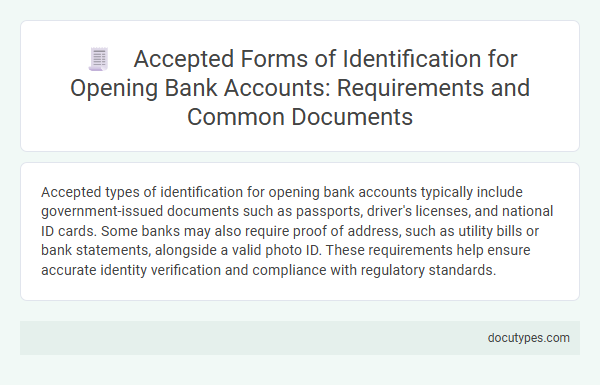Accepted types of identification for opening bank accounts typically include government-issued documents such as passports, driver's licenses, and national ID cards. Some banks may also require proof of address, such as utility bills or bank statements, alongside a valid photo ID. These requirements help ensure accurate identity verification and compliance with regulatory standards.
Overview of Identification Requirements for Bank Accounts
Identification is essential when opening bank accounts to verify your identity and comply with regulatory standards. Banks require specific forms of identification to ensure security and prevent fraud.
- Government-issued photo ID - Usually required as the primary proof of identity, such as a passport or driver's license.
- Proof of address - Accepted documents include utility bills, lease agreements, or bank statements showing your current address.
- Social Security Number (SSN) or Tax Identification Number (TIN) - Used for tax reporting and identity confirmation purposes when opening an account.
Why Banks Require Identification
What types of identification are accepted for opening bank accounts? Banks commonly accept government-issued IDs such as passports, driver's licenses, and state ID cards to verify identity. These documents ensure the bank can confirm your identity securely and comply with legal regulations.
Why do banks require identification when opening an account? Identification helps banks prevent fraud, money laundering, and unauthorized access to financial services. Verifying your identity protects both the bank and your assets by establishing trust and security.
Primary Forms of Accepted Identification
Primary forms of accepted identification for opening bank accounts typically include government-issued photo IDs such as passports, driver's licenses, and national identity cards. These documents serve to verify your identity and ensure compliance with regulatory requirements. Banks may also require proof of address alongside these primary IDs to complete the account opening process.
Secondary Forms of Identification Documents
Secondary forms of identification are often required to supplement primary IDs when opening bank accounts. These documents help verify the applicant's identity and provide additional security for banking institutions.
- Utility Bills - Recent utility bills such as electricity, water, or gas statements serve as proof of address and supplementary identification.
- Employee ID Cards - Official workplace identification cards confirm the applicant's employment status and identity.
- Credit or Debit Cards - Existing bank-issued credit or debit cards verify the applicant's financial history and identity.
Government-Issued Photo IDs Commonly Used
| Type of Identification | Description | Common Issuers | Key Features |
|---|---|---|---|
| Driver's License | Government-issued photo ID primarily used for driving privileges. | State Departments of Motor Vehicles (DMV) | Photo, full name, date of birth, signature, unique license number |
| Passport | Official travel document proving nationality and identity. | National Passport Agencies or Departments of State | Photo, full name, date of birth, nationality, unique passport number |
| State Identification Card | Non-driver photo identification issued by state authorities. | State Departments of Motor Vehicles (DMV) or Equivalent | Photo, full name, date of birth, signature, state-issued ID number |
| Military Identification Card | Issued to active or retired military personnel as proof of identity. | U.S. Department of Defense or Military Branches | Photo, full name, rank, date of birth, military ID number |
| Permanent Resident Card (Green Card) | Proof of permanent residency status in the U.S. | U.S. Citizenship and Immigration Services (USCIS) | Photo, name, alien registration number, date of birth, residency status |
Alternative Identification for Non-Citizens
Opening a bank account requires valid identification to verify the applicant's identity. Non-citizens often need alternative forms of identification when traditional documents are unavailable.
- Passport - A valid foreign passport is widely accepted as a primary identification document for non-citizens.
- Consular Identification Card - Issued by a foreign government, this card serves as proof of identity for non-citizens residing in the host country.
- Individual Taxpayer Identification Number (ITIN) - This number allows non-citizens to open bank accounts even without a Social Security Number.
Banks may also accept secondary documents such as utility bills or lease agreements to support the identification process for non-citizens.
Special Considerations for Minors and Students
Accepted identification for opening bank accounts typically includes government-issued photo IDs such as passports, driver's licenses, and national identity cards. Financial institutions may also require proof of address and Social Security numbers or tax identification numbers.
Minors often need a parent or guardian to co-sign the account and provide their identification along with the minor's birth certificate or school ID. Students may use student ID cards in combination with standard identification, especially if they lack traditional forms of ID. Banks may also offer special student accounts with relaxed identification requirements to facilitate easier access to banking services.
Identification Requirements for Online Account Opening
Accepted types of identification for opening bank accounts online typically include government-issued photo IDs such as passports, driver's licenses, and national identity cards. Banks may also require proof of address documents like utility bills or bank statements to verify residency. Your identification must be valid, unexpired, and clearly show your personal information to meet online account opening requirements.
Handling Identification Issues and Rejections
Acceptable types of identification for opening bank accounts typically include government-issued IDs such as passports, driver's licenses, and national identity cards. Financial institutions may also require proof of address documents like utility bills or bank statements for verification purposes.
Handling identification issues involves verifying the authenticity of submitted documents and cross-checking client details against official databases. When identification is rejected, banks usually provide clear reasons and guidance on obtaining acceptable forms to complete the account opening process.
What Types of Identification Are Accepted for Opening Bank Accounts? Infographic

